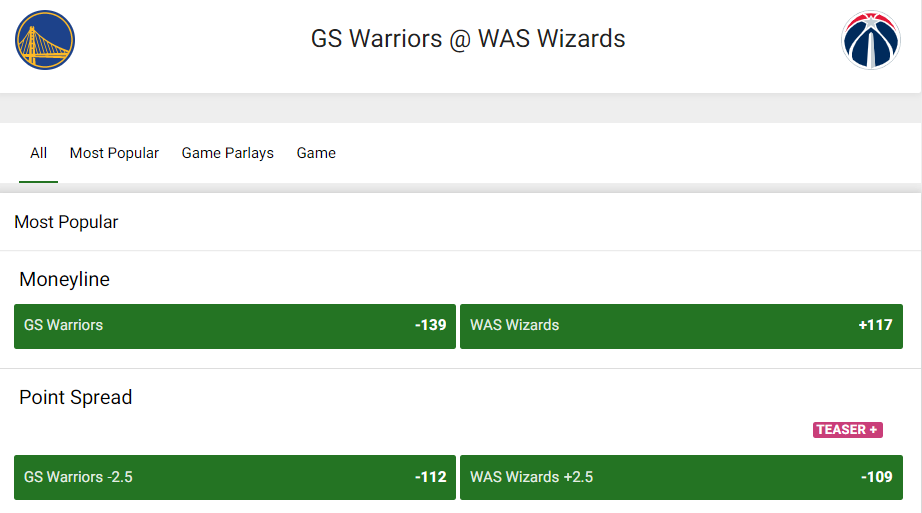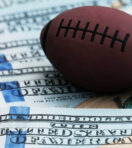Point Spread Betting guide

Point Spread Betting Explained
Point spread betting is one of the many ways you can place bets on sports. While it’s a little more complicated than standard moneyline bets, it's still fairly simple to understand. In this guide, you’ll be able to learn everything there is to know about point spread betting, including what it means and the best point spread betting strategy.
Best USA Sportsbooks For Point Spread Betting
| Rank | Partner | Bonus Amount | Review | Link |
|---|---|---|---|---|
| 1 |

|
€40 Free Bets | Review | Visit |
| 2 |

|
Bet €10 - Get €50 | Review | Visit |
| 3 |

|
100% Up To €125 | Review | Visit |
Table of Contents
What is a Point Spread Bet?
Point spread betting is one of the most popular ways to bet on sports, and it’s commonly used across many different sports at most major online sportsbooks. While it is very popular with experienced sports betting, it’s often a bit confusing for newcomers. At first glance, it looks a little complicated, but don’t worry, it’s not that difficult to understand.
The point spread is often referred to as betting the spread, handicap betting, or an equalizer. It effectively reduces the advantage that one team has over another, creating an equal contest. In a lot of matches, there are usually strong favorites and an underdog and in these cases, there’s not much value betting on the moneyline. Instead, the point spread offers a viable alternative, removing the advantage and leveling the playing field.
With this type of bet, the sportsbook applies an imaginary handicap to the favorite and an advantage to the underdog in the form of extra points. This way, the favorite has to win by a certain number of points while the underdog has to not lose by the same margin. Bettors can choose either side of the spread..
Points Spread Examples
Basketball
As an example, let’s say that Utah Jazz are playing the Brooklyn Nets. For this game, Utah Jazz are heavy favorites, with moneyline odds of -500. As a result, they have a -10 point handicap, while the Nets have a +10 advantage. The point spread odds would be displayed as follows:
- Utah Jazz -10
- Brooklyn Nets +10
This means that if you picked the Utah point spread as a Single, the Jazz would need to win by more than 10 points for your bet to win. If Utah lost, tied, or won by nine points or less, your bet would lose. Alternatively, if you picked the Nets point spread, your bet would win, provided the Nets didn’t lose by more than ten points. If the score is exactly ten points apart, it’s known as a push bet, and your stake is returned to you. If you don’t want to have the option of your bet being pushed, just bet on either side of the options that include a half point value. In this example that could have been a line of 9.5 or 10.5.
We have a lot of other good tips and pointers for betting on NBA basketball, check it out here.

Football
In another example we can use the Superbowl LV between the Tampa Bay Buccaneers and the Kansas City Chiefs. In this matchup, the Chiefs were the favorites and were given a 3.5 point handicap by some sportsbooks. The points spread odds were displayed like this:
- Kansas City Chiefs -3.5
- Tampa Bay Buccaneers +3.5
To cover the spread, the Chiefs would have to win by at least four points. Meanwhile, the Buccaneers had a 3.5 point advantage, so they would need to not lose by four points for this bet to be successful. In the end, the Buccaneers won 31-9, showing that the pregame odds don’t always matter.
Advantages of Spread Betting
Compared to moneyline bets, spread betting often offers more value in games with a clear favorite. As such, they can be highly profitable, especially if you consider the form of the two sides and their recent history. By researching head-to-head stats between the two teams, you can come to a pretty accurate conclusion over how you think the spread should look.
The other main advantage of spread betting is that it removes the possibility of a tied game. If the game is tied, one team will still win due to the spread. In the event that the scores are tied due to the spread, your bet is a push, and your stake is returned to you.
Pick’em Odds
In some cases, two teams can be evenly matched. In this case, neither team is favored by the sportsbook, and the moneyline odds are close. There’s a point spread of zero in these games, effectively meaning that when you bet on either team, you’re picking which team you think will win. These odds are known as pick‘em odds, and you can often find them for close matches in football, basketball, hockey, and other sports.
Run and Puck Lines
Point spread betting works well in football and basketball, where a large number of points are usually scored per game. However, it’s still used in other sports, including hockey and baseball. For these sports, though, it can sometimes appear under a different heading on the sportsbook. Hockey point spread betting is usually referred to as puck lines, while baseball uses run lines. As fewer points are scored in these games, the odds tend to be higher.

Point Spread Movement
Sportsbooks generally want to have equal money on both sides of the bet. Whether it’s a moneyline, point spread, over/under, or any other type of bet, they aim to have an even split between the two options. This way, whatever the outcome, they’ll always profit.
Because the sportsbooks want to encourage bettors to bet on both sides, they’ll move the spread to encourage bettors to place more money on the side that hasn’t been bet on. So a game that starts with a +-3 point spread may change to a +-3.5 or more. The odds can also change over time as more bettors place their wagers.
Bear in mind that although the odds and spread can change, this won’t affect any bets you’ve already made. It does present an opportunity to get better odds if you can predict the movement, however.
Point Spread Betting Strategy
Now you’ve learned about point spread betting, it’s time to go over a bit of strategy. Remember to always bet responsibly and avoid betting more than you can afford to lose. Here are our best tips for making the most of point spread betting:
- Make your own spread before looking at the lines - Before you even look at the odds on your sportsbook, predict how you think the match will go, and come up with your own point spread. This is a great way to find potential value in the odds. If the line is equal to or better than your prediction, you should place the bet.
- Predict spread movement - In the build-up to an event, the lines can change a lot, potentially leading to better value later on. If you pay close attention to these lines and how they change over time, you can start to predict their movement, leading to better betting opportunities for yourself.
- Double down if you’re confident - If you’re confident about your bet and you see the line has moved further in your favor, don’t be afraid to double down on your bet. As long as you’re not betting more than you can afford to, this can be an excellent strategy for making the most of your wins.
Now you’re all clued up on point spread betting, it’s time to sign up and start betting! Take your pick from any of our recommended sportsbooks, making sure to claim your welcome bonus when you first sign up.













